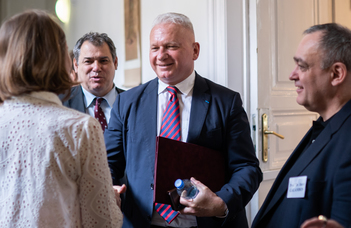The ELTE Department of Chinese Studies is 100 years Old
László Borhy, Rector of ELTE, Imre Hamar, Vice-Rector and Head of the Department of Chinese Studies at ELTE, and Imre Galambos, professor of the University of Cambridge, gave speeches at the jubilee event. Exchange students from the Zhejiang Conservatory of Music presented classical Chinese and international works, and a Hungarian song was also sung as the last piece of their performance.
The history of Chinese language teaching in Hungary goes back to 1923, when the Institute of East Asian Studies was established at Pázmány Péter University, the predecessor of ELTE. Its first head was the turkologist Vilmos Pröhle, followed by Lajos Ligeti. The latter scholar is often referred to as the ‘Father of Sinology in Hungary’. He was a student of Paul Pelliot, a world-renowned professor in Paris, and he brought to our university in Budapest the expertise and methods he had acquired in the capital of France.

Relations between China and Hungary gained momentum in the 1950s, as a result of which many Hungarian researchers had the opportunity to study in China. Upon returning home, they continued their academic activities at the department. The real breakthrough came in 1985 when Chinese Studies became reclassified as an “A” subject, that is, it became a major similar to English, French, and German. Since then, more and more students have chosen Chinese as their main subject.
“Although the conditions were difficult and there was a lack of full-time professors, in 2000 our department also launched a doctoral programme in Sinology, which was a step forward of historical significance, ensuring the training of a new generation of sinologists," said Imre Hamar recalling the start of the Ph.D. programme. The professor took over the department in 2002. Under his leadership, the teaching of the Chinese language underwent significant development at ELTE. In 2015, for example, the only Chinese teacher training Master’s programme in Hungary was established here.
It is also widely known that the department gives out high-standard scientific publications. In 2009, the ELTE Institute of East Asian Studies and the ELTE Confucius Institute jointly launched the biannual Journal of East Eastern Studies, which received an international award.

László Borhy, Rector of ELTE, pointed out in his welcome speech that the teaching of Chinese language and culture has been continuously developing since the establishment of the department, and its popularity is clearly reflected in the number of students admitted. This year, a total of 201 students are studying the Chinese language in undergraduate, postgraduate, and doctoral programmes.
The importance of learning the Chinese language was also emphasised by Professor Imre Galambos from the University of Cambridge. He added that he was happy to be part of the 100-year history of the Chinese Studies at ELTE, as he studied Chinese language and literature at ELTE between 1991 and 1993, and he also graduated from there. As he said, the idea of a joint doctoral conference already came to his mind during the coronavirus pandemic, so he was looking forward to its realisation. “It is important that Ph.D. students engaged in Chinese Studies can get to know each other’s fields of research and support their fellow sinologist candidates in enhancing their work with their thought-provoking questions,” he emphasised.
A total of nineteen Ph.D. students presented their research activities at the conference with great success. The organisers believe that the meeting represents the beginning of a fruitful collaboration that is beneficial for both parties and advances the cause of international Sinology.

